#but that doesn't mean you should try to world domination just because he rejected you
Explore tagged Tumblr posts
Text

Fukuchi really made his 'failed-before-getting-attempted relationship problem' a world wide crisis
#I mean I get it fukuzawa is super pretty and such#but that doesn't mean you should try to world domination just because he rejected you#old man yaoi#the source of all problems in yokohama#japan#and the rest of the world#fukuzawa yukichi#fukuchi ouchi#bsd#bungo stray dogs#bungou stray dogs
28 notes
·
View notes
Text
queer theory is actually a nightmarish frankensteinian creation of postmodernism, and post-modernists philosophers have frequently and explicitly been pro-pedophilia, because this is a logical consequence of what post-modernism says is true: there is no (epistemic) certainty or stable meaning.
when my conservative parents tell me they basically associate "lgbtq" with "maps" and pedophilia, they have reason to do so, given how "queer culture" is fundamentally a creation of post-modernist values, and post-modernist estimations of sexuality. everything is fluid, no binary exists, no meaning is fixed, so there are no defining lines, which means lines cannot actually be crossed. homosexuals can be bisexual, man and woman are interchangeable meaningless terms, and attraction to children is just one of the many ways sexual fluidity is expressed in humans, a benign and normal thing that should be released from modernist moralistic confines
that is queer philosophy, and it is actual queer culture. so not only are LGB folk being told they should celebrate the reclamation of an awful slur that explicitly others them as "perverted" and "strange", but now they are told to embrace queer culture (which means queer identity and philosophy) which not only declares their reality as abnormal and unreal (same-sex attraction is myth, since there is no such thing as sex and attraction is fluid), but also defines them explicitly with sexual perversions like pedophilia and bdsm: which IS EXACTLY WHAT HOMOPHOBES BELIEVE ABOUT THEM.
when queer culture is predicated on subjective feelings of identity needing to be validated, celebrated and "set free" from modernist (read definable, material and epistemological) structures, then the distaste for MAPs from queer folk doesn't mean anything, because even if MAPs are publicly rejected by queer culture, they are embraced and validated by queer theory and post-modernist philosophy.
what is doubly baffling to me is how the lgbtq+ community has tainted a movement for gay rights, you know, people who are being killed and ostracized for being same-sex attracted. not only nullifying their experiences and struggle in being same-sex attracted, not only associating their neutral, normal orientations with perversions and kinks, making something neutral political . . .
but they have also actively decentered a movement for homosexuals and bisexuals in order to accommodate identities that have NOTHING to do with that struggle or fight. intersex conditions, gender dysphoria, and asexuality have nothing to do with the oppression LGBs have faced for their sexual orientation and gender nonconformity, their culture of genderlessness. the idea that men and women can wear and present however they want, love and be attracted to the same sex, without it altering their material status.
EVEN MORE INFURIATINGLY, queer politics has offered almost ZERO challenges to patriarchy. by throwing out definitions, throwing out distinctions, it has relegated the essence of oppression to an individualistic, liberal fantasy that is powerless to change the system, and so can only grant us "spicy" patriarchy. dominance and submission, patriarchal inventions, are now cool kinks that every couple should try. gender is now open access (but still necessary), so men can wear heels and still call women slurs and violently harass them. transmen can go by he/him and still be refused abortion access! gay people are gender fetishists, not sinners. nothing has structurally changed, it's just we have cool names now! :)
so now LGB and women all over the fucking world are relegated to this homophobic misogynistic hell whether we turn to the left or right, and when we speak up about it, conservative homophobes and misogynists confuse us with liberal perverts, and liberal homophobes and misogynists conflate us with conservative sadists.
the structure doesn't change. there is no actual progress. like, same-sex right and women's movements all over the world have suffered for this. because white liberal westerners wanted to play around with words and have that count as activism.
i fucking hate queer theory and politics. i fucking hate how rich western whites shit on every human rights movement while capitalizing on them.
468 notes
·
View notes
Text
musings
Tenko saying ‘I chose to do this, I destroyed this house and my family out of my own volition’ is clearly a cope, evidenced by the following rationale ‘Otherwise, why would I even have these hands? Who would be able to explain why I was born this way?’
→ The neat easy solution is then, of course, to have it revealed that AFO gave Tenko Decay. He wasn’t supposed to have those hands. He wasn’t born this way. He didn’t actually want to destroy the house or the family (was just a kid feeling the emotions of a valid temper tantrum).
→ Therefore, he is not evil, he does not hold malice, he is not meant to destroy. He had wrongly believed his purpose was to destroy things. Therefore he is not supposed to be a Villain trying to destroy Japan. And he should stop.
→ This fits with what AFO said about Shigaraki/Tenko ‘To this day, you’ve never made a single decision on your own’.
For a Trump Card reveal though (assuming that 'AFO Gave Tenko Decay' is the trump card reveal) that’s supposed to give AFO more control over Shigaraki…
→ Tenko wasn’t supposed to be born this way… therefore he has no reason to listen to AFO, and every reason to fight back. Doesn't quite work.
→ If you take what Deku has done as Shigaraki finally receiving the blessing of ‘even if you were born with these hands, a Hero should still come and hold your hand’ (acceptance of himself, what he’s done, acceptance from Society Rep) then it's also a bit too late - he was rescued despite having these hands; but now that those hands aren’t actually his, he gets… Rescued+? Also doesn't quite work.
→ What it most likely has to be is: the shock and damning amount of tragedy of the reveal - beyond just being given Decay, but that AFO engineered his whole life - could render Shigaraki docile. For Shigaraki who tried so hard to assert himself and to lead with the creed ‘Do whatever we want’, it would undo all his efforts.
→ It's the fact that Deku has now symbolically rescued Shimura Tenko from the Shimura tragedy. That's more or less done. He's symbolically 1) stopped the massacre, 2) fixed the fact that no one reached out a hand, and 3) assured Tenko that even if he was born with destructive hands and feelings, a hero should still be there for him.
But even after all that, Shigaraki still insist on being a Hero for the Villains. Even after all that, Shigaraki believes he needs to keep being a Villain in order to give his friends what they want. He's intending to still rampage, in a way that's hard to counter because it's such a pure motivation... so it's the perfect time for the reveal that AFO was behind even this desire. Indirectly.
→ Previously, the symbolism of the Shimura House was that it was the accumulation point of social forces that had/will always reject Tenko and what he values (his outcast friends). That AFO might have built the house means those social forces don't actually exist, or don't exist in a capacity that would've given Shigaraki such hatred; it was AFO all along, and Shigaraki has been deluded about rejection. Essentially - Shigaraki's Jaku speech? Proven completely false. No relevance to reality.
And if he's deluded about this, then Shigaraki has no reason to feel rejected, to see himself as being rejected - he has no reason to want or have to be a Villain. Similarly, then, the grudges the League has with the world are also misguided. Shigaraki has no reason to want to continue being a Hero for the villains. Shigaraki must step down.
→ While this does stop the problem of Shigaraki's rampage, I feel like it also obliterates all remaining shreds of Shigaraki/Tenko's character. Even if his hatred fades, even if he's empty, he needs to be a Hero for the villains... So when you take away even that, what's left? He's emptier than empty, and thus will be easily dominated by AFO.
→ Perhaps it's time for Deku to rescue Shigaraki from AFO. However, not quite from AFO's construction of the reality - not when AFO revealed it himself and shattered it. No, it's time for Deku to rescue Shigaraki from his lack of agency...
…So it would be so funny if Deku has to sorta change course to convince Shigaraki that Decay is his power now and what matters is how he uses it and he should get angry and that he’s right for wanting to be a Hero for the villains and so he should help destroy AFO. Sorta the lessons from Todoroki + Eri + Gentle/Nagant combined.
30 notes
·
View notes
Text
Guru Pathik's 7 Chakra Exercise
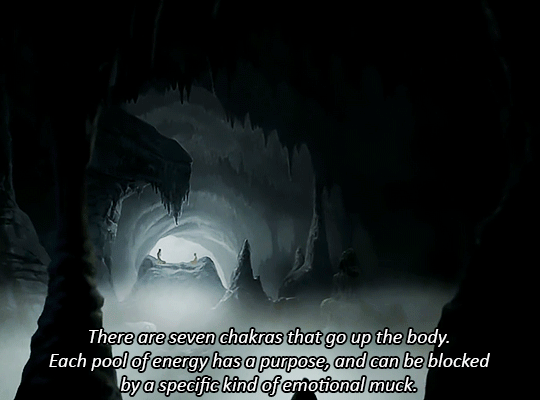
ATLA is a series that speaks to our sensibilities on life, as well as one of the best coming-of-age stories to be released this century. To help myself, I thought I'd write-up the same process Aang underwent when he opened his chakras for personal growth and self-evaluation.
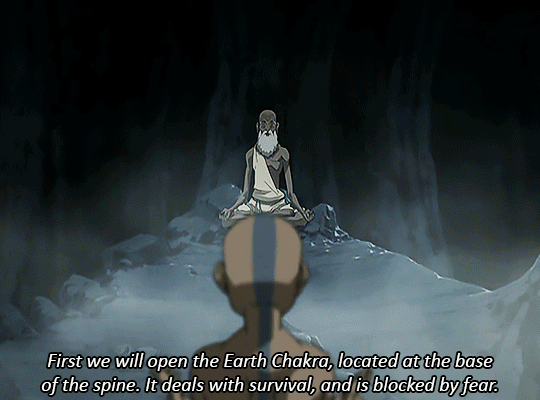
What am I afraid of?
Failure brought on by a lack of progress. That this point in life will never pass and I will continue to leave things unfinished. I couldn't stay at my first high school. My foreign language requirements kept lingering. I never finished my high school career. I had to take a gap year and go to a different school. I keep getting course incompletes. I struggle to find the motivation to acquire career certifications. It takes me too long to get over anyone. I've been in a stable relationship for years but still haven't gotten engaged. Always made to feel like I'm incapable, when it has more to do with being unwillingly unable. I want to let things flow, but I forget I once knew how to.
Pathik: you are still human, and humans make mistakes, stumble, and fall. When you trip in life doesn't define you, how you get up does.
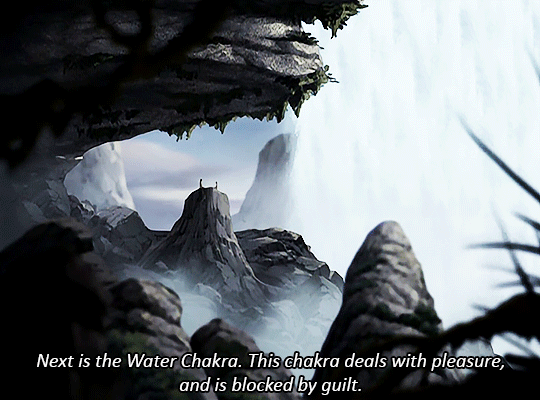
I failed to meet my potential. My grades never aligned with my intelligence. I could've done more. I don't deserve love if I can't take pride in myself. All I do is let others down.
Pathik: if you let the image you have of yourself be defined by the people around you and your environment, rather than your own actions and character, you let results become your meaning rather than your intentions. You have had many opportunities to be an average, maybe even horrible, person, but you must remember you always chose the highest ground available to you. A lack of success does not mean a lack of good. You are allowed to be happy even though you aren't perfect. You are not a bad person for failing, you become a bad person when you stop learning from failure and let it fester into hate.
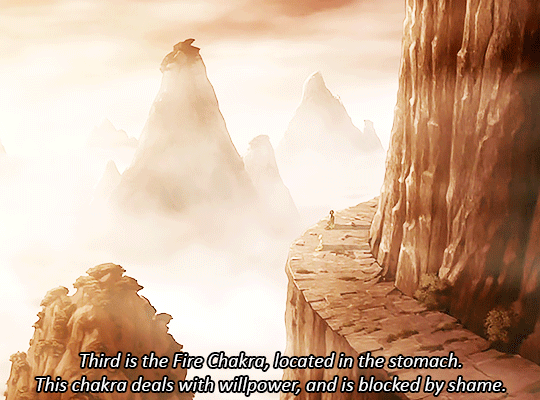
What are my biggest disappointments in myself?
I'm never who I set out to be. I was never a good enough son or brother. I didn't make 1st band. I couldn't go past the tipping point to fully dominate as an individual debater. My talent couldn't offset my look being unmarketable to make it in the recording industry. I could never win enough in card games to garner respect. Seeing anyone as worthy of trust became impossible for me. All I will ever get is rejection, within my control or not.
Pathik: Letting your failures undermine your zeal for life is a fallacy. While you experience failure, you still continue you to try to push to achieve something because you never truly fall out of love with the process. Music, Debate, card games are still crucial parts of your life you fall back on: while you have become shy with your talents, converting them into half-effort karaoke, panels, and dulling your edges, you stop committing to yourself. The same is true with the work you need to finish, you always hold out hope you will succeed but you remain too afraid to try to. The first three chakras balance your id, ego, and superego, the three have become warped in the same lamentations. Whatever you do, do your best to not be paralyzed by the changing current, afraid of getting hurt. You must take the risks to obtain something worthwhile.
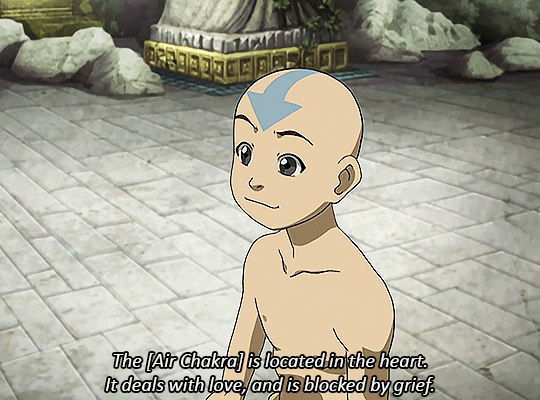
My grandfather. The only reason I know what a sense of family and community is was my grandfather. I met someone who gave me that same sense of naturalism but she passed on as well. Then my aunt, the final person who was always in my corner left this world again and the isolation from the pandemic hit especially hard for that reason.
Pathik: their love isn't gone, it just takes time for people to convey love to you the more damaged and twisted up inside you have become. Loss and betrayal have become your familiar feelings where security, comfort, and belonging should be. You must remember you are never alone. Even though you may not feel the love reaching you is all that deep, there are still people who would mourn you. Your family would miss you, there are still people that both need, want, and pray for your survival. Part of your identity is your ability to unify, you have never shied away from this responsibility. Whether people say it or not, people do appreciate you for carrying their spirits as a part of your own and see you as valuable. You must be willing to accept love in order to commit to giving it back.

In what ways are you not speaking your truths?
My identity puts me into a place where my life is insignificant to those around me. Straight men of color are given the least compassion of any diaspora, being a member of the most slaughtered racial demographic and religious affiliation means my life is societally more dispensable than my white, female, or non-Christianized background counterparts. While it is a contributing factor as to why I get stifled, there's only so many times I can shake it off. I'm weary. Weary of vehemently androphobic women. Weary of the structural inequality in which the individuals a part of it are ignorant of their own white exceptionalism. Weary my labels on paper throw me into the model minority myth but I receive none of the privilege associated with it. Weary that of any random stranger, I would most often have the most contempt and bile directed at me, even if only implicit.
Pathik: you seek to control your identity in an era people want to assert themselves the most aggressively against their born identities. Asian-Americans and Hispanic-Americans continue to voluntarily whitewash because of a sense of self-hatred they were socialized with for being different. Accepting your difference isn't a weakness just as being cisgendered isn't a strength. Being secure in your expressions is something you ground yourself in, some in this world will attempt to taint the purity of that expression of the self. There is nothing wrong with accepting your own nature. You have a devotion to who you are in ways people can't reconcile, feel blessed you can. Coming off as lacking confidence in your identity to appease other minimizes yourself; you don't do so in front of students no matter how carefully your frame your rhetoric, why should you need to worry about appearing meek to adults to not intimidate them? Humility is not holding yourself back to make sure you never have a stronger trait than anyone else, humility is simply knowing you're no better than another person even though they have insecurities you may not.
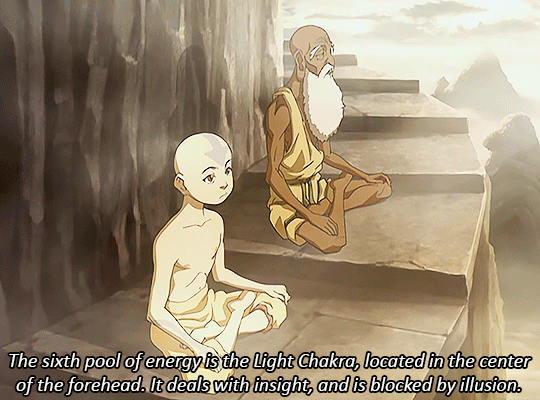
I never really knew if my life was my own, Everyone always says anyone is capable of anything if they set their mind to it, but I stopped believing that a long time ago. I tried to convince myself it's because I didn't put forth enough effort and therefore didn't try hard enough even though I gave everything possible. Was I always meant to feel this drained? Living in reality constantly feels as if it comes with a tax, and I have too many dreams to make even an infinitesimal amount of them a reality. The choices I'm making are putting my wheels in motion, but it doesn't feel as if I'm actually going anywhere.
Pathik: at times, the pathway to enlightenment is so treacherously scenic, we often forget and lose parts of ourselves along the way. But to think the suppression of parts of oneself is a method to self-actualization is an illusion, folly of a great order. Humans often define themselves by trauma rather than events being defined by their character. Each action a person takes represents the image of themself they put out into the world. The paradox of life is we think we are defined by our actions and accomplishments when history is only made so by us living it. Everything is connected. Differences in the outcome of human action are only distinctions humans make for themselves, whether you succeeded or failed is not determined by a goal, but the process by which you learned. Life is just as much about the journey as it is the destination; without the journey, the destination is unearned. Even if it feels like you aren't making progress, to have faith is to believe the only constant in life is that change will happen, and to be at peace with that. Stoking change in your favor rather than fearing it is the manner in which you win fortune's favor because fortune favors the bold, not the stagnant. As long as you are doing something, you are achieving something, even if capitalism makes it seem otherwise.
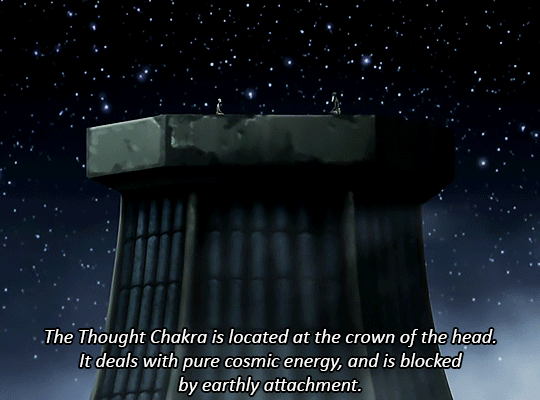
What attaches me to this world?
The thought of making the home for myself I have yet to find, the partner that will care for as deeply or even more so than they care about themselves. Children I will love unconditionally and try my best to impart no expectations on even though they are my blood. Guru Laghima fully opened this chakra and was in complete harmony with his bending because he transcended his mortal coil and became one with air. There's a certain melancholy in knowing how to transcend, to feel alone of your own volition, no one truly grasping your sense of self. Yet, all I feel is pity for Laghima and Zaheer, especially upon P'Li's death. The gift of life is wasted on the living, and there's a particular nihilism that pairs with detachment. Connection to humanity is the meaning by which life becomes worth living. I fight for the sake of others, not to spite their objections. Balance only exists in conflict, not in the absence of it: all that does it bottle conflict up until surfaces. If change is the only constant, we will find new things to be attached to. That sense of novelty is why any singular earthly attachment and its absence aren't the answer. Cosmic power wants me to make deep and meaningful connections, not toss them aside. This is not muck in the swirls of energy within my soul, it is a dam I constructed myself that should only be broken upon death's doorstep. Otherwise, I lose sense of the world and become even more lost than before.
Pathik: in many ways, being attached to all is the same as being attached to none. Seeing value in every little thing, the tiniest components that help balance our world, is a means to connect to the universe, but it does force you to release the pool of energy you build up from time-to-time. Not only will you need a constant flow of new individuals and experiences in life, you will need an equally constant flow of individuals and experiences leaving your life, meaning happiness and sorrow will be at balance. Choosing to live in this strife isn't considered a noble choice within chakra manipulation, but is for a Muslim's relationship to creation. Depersonalizing consequentialism is the only real way for the creek to flow smoothly, but the absence of life indicates no change to the creek at all. Life can be tumultuous but finding peace in life is knowing no obstacle is truly bigger than you are if you get over yourself.
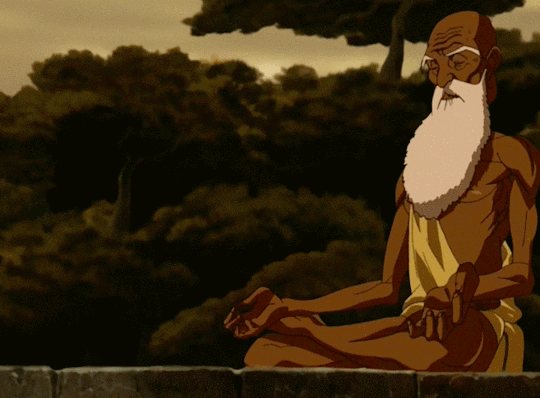
0 notes
Note
To start, it would be really silly of me to TL; DR your answer when, well, you can see below.
To start a second time: this is all totally my own opinion! I do not endorse erasing anyone else's context, concerns, or commitment to their own valid ideas! Fiction is meant for our minds to chew on, and we all taste different things! So no shade at all cast by me as a result of my words to follow. I think I just haven't written anything Haruhi related in too long so guess you get to see it first. Thank you for your patience!
My interest in Haruhi Suzumiya as a character waxes from wistful interest and wanes to disdain, on a given week. Unquestionably, she is a tempest in a teapot, a distinct role that helped capture fandom interest and help the show and books stand out among its peers at the time. In a world before the Isekai domination of the anime industry, she stands out as any one of us, desperate to be reborn or discover the secret layers in our world.
I like how Haruhi's character is built up! I love the raw emotionality captured in her responses to to the world!
But gods does she exhaust me, and not in a cute, too much energy way. (And its not because she's physically and emotionally abusive character in the first episode and occasionally throughout the story later (well, not *just* because of this, but it doesn't help).) No, she exhausts me as a character because as written by Nagaru Tanigawa, Haruhi is not provided demonstrable room for growth or agency. To me, she’s only given space as a force of nature, and not a protagonist in her own right.
Personal Context: The Melancholy of Haruhi Suzumiya was really important to me as I grew up and in my heart of hearts, still is. I didn’t catch it until the show came out, but I devoured it soon after. I read all the books, watched endless eight (and was not nearly as upset as most folks) as it came out, bought all the content available in English and wrote over 140k words in fanfiction, including my first ever novel length work. I didn’t seek out the games and my interest had waned enough that by the completion of The Disappearance of Yuki Nagato Chan, that I felt I could comfortably close the book on my love and desire for more content. This is and probably will always been my personal Problematic Favorite show, and its not because of Endless Eight.
So, when I say I don't really like the titular character, Haruhi Suzumiya, I mean it only in the most disappointed way possible. Haruhi is a perfect example of thwarted catharsis. If you treat her like a protagonist, she's even more a passive contender in her own story than Mikuru. She does change in later novels, but for me, it didn't feel meaningfully addressed, but I'll go through that later.
Kyon is the story POV, so often all we hear are his reservations, his complaints, and even his decisions, occasionally. First posed as an audience stand in, he's an unreliable narrator that the audience has to decipher when he is speaking fact, feeling, or self imposed cynicism. The stories are all cycles of Kyon learning about potential change, something he desperately yearns for in his heart of hearts, and finding the resolve to reject the change, for the sake of the others whom he's found purpose in. He is, in many ways, Campbell's Hero's Journey refuted.
Koizumi is something between a cleric and a caretaker, worshipping the presence that his heart and mind tell him are the center of reality, but also trying to manage a teenage girl who by any other right (or rite) would be his peer and potential crush. Haruhi gave him purpose, and he has to struggle with the idea of what that means for who he is. Or who he would become, if that sleeping god should wake or - worse still - stop dreaming. His sense of value, his life's philosophy is a stack of cards and he has only one other present-day human who's *not* wrapped up in the same religion to talk to about it.
Yuki is a monstrously unknowable entity crafted to observe a universal nuclear bomb and maintain a rigid status quo that, should it explode, means she literally would have no purpose. She's in a place where she cannot observe safely, slowly deteriorating under the exposure to radiation, even as her masters study the effects as if an interesting side effect to their trained lab rat. When she does exercise autonomy, it nearly defuses the bomb itself, almost gets herself deleted, then saved by one of the only people who've ever shown her concern, then gets emotionally quote-unquote 'friend-zoned'. I've got things I think about for Yuki.
Mikuru is a quasi willing participant in an experiment to examine the closed loop of history. Memory-editted and neurally-bound to a truth that can't be spoken to a paradox, Mikuru has little recourse but to accept her fate as slave to the present. Any complaint might trigger that paradox into further altering time itself, or reveal her existence as being from the future. That said, even Mikuru has the means to express some small dissatisfaction with her indenture and find joy in the present due to her willed ignorance. We even get to see a version of Mikuru that has coped with all the pain and come out, if not better, at least alive and seeming happy. In some ways, this sort of deflects some of the excitement of seeing her character change (we know who she's supposed to become) but how she gets there is still a journey we can explore.
Haruhi. The way I see Haruhi, on the other hand, IS AS the status quo. Worse, she's layers deep in the status quo that she doesn't have the agency to even reject who she is, because even that would be more of the status quo. She *wants* to fight it. She desperately wants change. But the construction of the story is to prevent her from having the agency to choose. Characters without agency are... not characters. Not fun characters to me, at least. They are obstacles, tests, or challenges. Forces of Nature. The dragon around which the rest of the story orbits.
This is largely true for the story. Even when the plot should demand that Haruhi confront that she might not be in a mundane world in Snowy Mountain Syndrome, Tanigawa flinches. When Koizumi claims it was all a mirage, Haruhi accepts this, without fanfare. It could have been a major pivot, a true change to how the story continued to unfold. Instead, it was a cute lil story and shows Haruhi, who has no awareness of The Disappearance storyline, being exceptionally caring for Yuki. It's the right sentiment, but the wrong time. I To me, it feels like the author trying to soften Haruhi after kinda-sorta laying the blame for Yuki's trauma at Haruhi's feet, but not doing the leg work to make this feel impactful. Nothing happens to change who Haruhi is. its always been part of her character, it seems like.
And then it all kind of tumbles out from there. Haruhi again and again get excluded from the events of the story, or is just used as an excuse to manufacture events, to keep her occupied.
Even in the climax of the novels, the Dissociation, Haruhi herself is sidelined again to care for an ill Yuki, and relegated to being a caretaker. Desperate to be part of the plot, she has to contrive a subconsious alter-self from when she was a child and still had hope in reality to become part of the plot. Worse, when we see her years in the future, she's unchanged, or flattened even further. She's happy and normal and so far as we can tell, past her high school flight of fancy.
Sasaki gets more opportunity to grow and change, from complete skeptic, to unwilling believer and near reverse-human-sacrifice, to choosing to be a human, and being not crushed by it.
I wanted Haruhi to be a real character. *She* wanted to be a real character, but the most we see her is early on, when she's actively a menace. By the time she should get a chance for change and improvement, she got used to take up time with characters who needed to be off-screen.
With all that said, Haruhi is also why I can't recommend the show. She is the Problematic. And, like, I am all for problematic women on certain axes. But not all axes. And its not just the sexual assault and the accusations of sexual assault to extort. Its that this show is grounded in reality. In a very deliberate fashion, this is supposed to be our world. Otherwise Haruhi would not be so upset at how boring the world is! Its not even an elevated reality like in most comedy anime, where it might slide as... less terrible. She just does these things to people and sulks when someone chastises her.
I blame some of it being the anime doing nothing to cut back on the edge of her personality from the first book. But there's even less resolution in the show. Season 1 has the first two episodes of a gut punch. Season 2 has her mean streak during the movie production (Endless Eight was Fine, actually. I'll fight on that hill.). And the Disappearance, as gorgeous and well done as it is, does not resolve any of this. And the fun or emotional weight of any of the other media, Haruhi Suzumiya-chan or Yuki Nagato-chan is not load bearing. They can't stand alone without the main show.
We don't even get to see the soften Haruhi that's supposed to represent some of her growth, from Snowy Mountain and Dissociation. Even Live Alive, they don't, in the show, describe how Haruhi did more than fill in, but that she used her powers to advertise the band.
Its all tension and no release. I want more from her. I want more *for* her! but she doesn't get it. And so it makes me sad. And I can't ooze all my love for the show without a huge trigger warning about her to recommend it to anyone outside.
Its not, strictly, Haruhi's fault, but the author's. Even so, I'm always braced when she comes back on screen, not sure if she's going to do something that I need to filter against the... character she could have been. Or worse, when she's not on screen, and thus can't really be part of this world she's created.
I am super glad you love her, and I do respect it entirely! Your passion and joy are infectious and I would never want to poison it! I just wanted to give an explanation, and its been rattling around in my head for weeks. And now, because of you and this, I'm back to editing my thinly veiled coffee-shop AU because this series doesn't let go once its teeth sink in. thank you for listening and hope I didn't come off as mean or anything!
The potential was endless, but the catharsis is way too late for me.
Hello, I vaguely remember you had a post about folks who 'didn't like' Haruhi of, you know, The Melancholy of Haruhi Suzumiya. Some of it, I thought, was a request for context or an explanation, but maybe not. Would you want someone to broach the topic?
if not, no worries, I've just lost the post, but have been mulling on a response for months. (Totally get if this is more of a Do Not Engage discussion or just want to say no, cause you might have deleted the post due to prior poor responses)
i mean. people can say whatever they want to me, generally (and often do). i'm not, like, directly opposed to someone coming in and explaining their perspective, and i do usually try to approach most things like that in good faith as much as i'm able to!
(but also, like, as the #1 haruhi defender on this godforsaken earth. my general stances are not a secret.)
so if it's something you want to share to provide context, go ahead, but i can't promise i'm going to suddenly understand or agree with you and i also can't promise not to respond with an essay about my own interpretations and reasoning but that should be expected by anyone who knows this blog at all
tl;dr: go for it if you want to!
(for context, since tumblr ate the original post for the time being: it was a post about my not understanding how someone could enjoy the series without liking haruhi as a character, which is something i stand by.)
#so I've never been good at tags#but I've had Thoughts about Haruhi for years#and like#the fandom isn't dead per se#but most of the dying fandom from when I was leaving were kind of chuds#so its mostly me rambling and friends and family members#who just look and nod sadly wondering whats wrong with me#I love this series and I wouldn't write 150k words about it#and still comeback and think about it if I didnt#haruhi included#now back to that thinly veiled coffee-shop AU...#thanks and have a good day!
9 notes
·
View notes
Text
Kaguya-sama Blind Reaction/Analysis: S1E1
Hello everyone, this is my blog which I am currently using to react to and analyze Kaguya-sama: Love Is War much more seriously than I should analyze any romcom.
I have only seen the first episode of the anime, which this post shall explore using far too many words. If I'm feeling particularly motivated, I may read the manga as well.
My analysis will contain spoilers. If you're thinking of watching this show and haven't seen it yet, I recommend you at least go check out the first episode yourself before reading any further. I don't know what the rest of the show is like, but what I've seen so far has been both entertaining and thought-provoking.
I'm going in mostly blind, but not entirely blind. There are a few images of the anime and manga that I have been exposed to, although without the attached context. Due to cultural osmosis and the sheer popularity of this work, perhaps that was almost inevitable.
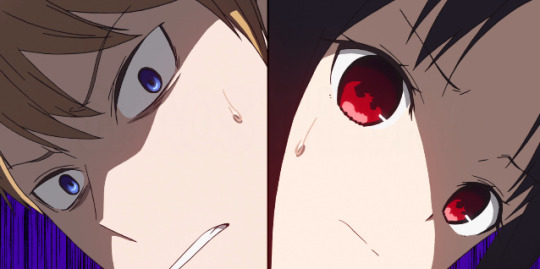
Figure 1.1.1: Why did this guy write an essay about a single episode of an ongoing romcom?
Kaguya-sama: Love Is War
Season 1 Episode 1
I Will Make You Invite Me to a Movie / Kaguya Wants to Be Stopped / Kaguya Wants It
Power dynamics in relationships
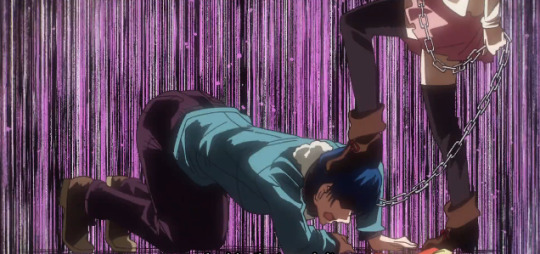
Figure 1.1.2: Immediately, the mangaka's tastes become clear.
I heard a saying once that really stuck with me: "The partner who cares the least has all of the power."
In the world of dating, I often sincerely believed this saying. You may yearn for someone's affection, but the other person need not give it to you until they are willing and ready. No matter how much you want it, you can't make someone more interested in you, unless you resort to being roundabout, such as adding some mystery and intrigue to your courtship. But is that excessive?
I once felt a potential lover slipping through my grasp, and before I knew it, I found myself chasing after them. As I was yearning for their attention, I felt as if I'd lost my dignity. It was humiliating. Painful. Was it just that they weren't the right person for me? Or was I not funny enough? Not charismatic enough? Not interesting enough? Too clingy? Too talkative? Should I have been more distant and given them more space? Did I seem too weak? Too eager? How should I have maximized my desirability? Regardless, I had surely lost. Perhaps they wanted the satisfaction and validation of conquering me. Playing me for a fool and asserting their superiority by being so distant. Isn't that right? Or is that just insecurity speaking? At what point is it ideal to cut one's losses and walk away?
If someone desperately wants the object of their affection to desire them, does that make them pathetic? Does it make them a loser? If you show more vulnerability and desire than the other person, does that truly make you the weak one in a relationship?
These questions plague our two protagonists and seem to be a driving force behind the main conflict. Since I have also grappled with how much to reveal my own feelings of desire, I find Kaguya-sama: Love Is War to be a particularly fascinating show.
Desire without action
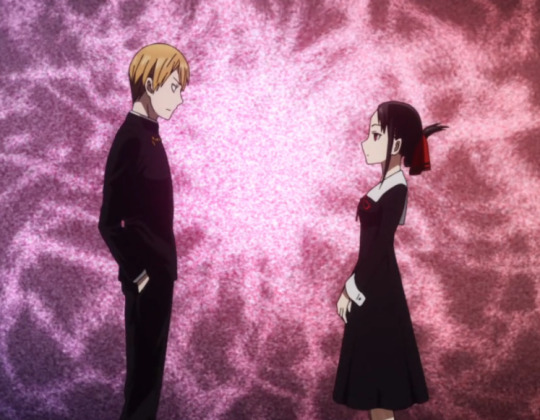
Figure 1.1.3: Our protagonists are gifted with impressively high academic intelligence paired with impressively low emotional intelligence.
The show wastes no time in introducing us to our two main protagonists. Kaguya was born into a family of high stature (and says "ara ara" frequently enough to power a small country of weebs), whereas Shirogane is a "commoner" (Kaguya's word, not mine) who worked hard to reach the pinnacle of the student body. Like timid schoolchildren, they're crushing on each other, and yet they refuse to admit it due to their pride. Instead, they focus on getting their "opponent" to confess their love first.
What stuck out to me immediately is how they both have different ideas of what their relationship would be like. Shirogane envisions Kaguya as blushing, shy, and conventionally cute, whereas Kaguya (thankfully) envisions herself taking absolute dominance over Shirogane (which plenty of people should see coming as a character trait after the anime's very first scene). The bad news about this is that their two fantasies are at odds. The good news about this is that the mangaka has fantastic taste -- you can learn a lot about a storyteller based on the characterization of a love interest or lead character of the author's preferred gender.
In the event that the two of them become an actual couple, I wonder how on Earth they'll reach a compromise as to how they'll treat each other. Perhaps they will have to figure that out before they can even get that intimate.
I appreciate that we get to see both of their perspectives. It hammers home how everyone has a different truth in regards to what they desire and what they experience, and the show does not hold back when it comes to showing just how different these truths can be -- such as a certain lunch-themed sequence that I will talk about later. This works to great dramatic and comedic effect.
That said, when you spend your time fantasizing about what could happen instead of actually taking action, time is not so friendly to you.
Half a year passes.
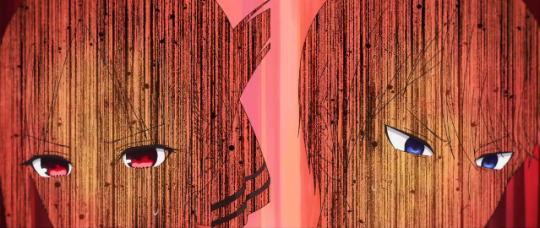
Figure 1.1.4: Two geniuses dedicate their pride to wasting their life and energy.
Immediately, I got the impression that whoever wrote this segment of the story knows what they're doing. This is too real. And by "too real", I mean I very much appreciate the realism. How many of us have waited for ages (or for eternity) to confess our feelings to a specific someone?
This is the curse of having a crush and being incapable of acting on it. It's also why I hate having crushes.
Manufacturing affection in others, AKA the extraction of vulnerability
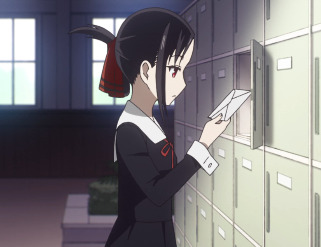
Figure 1.1.5: A plan is devised to weaponize jealousy in the name of affection.
To express your truest feelings means being vulnerable. That implies taking a risk and feeling responsible for any potential consequences of rejection, as well as putting our dignity on the line. It would be so much easier for the object of our affection to make themselves vulnerable instead. So instead of being direct and honest, we act indirect. We drop hints. We act suggestively, but not explicitly. We may even place them in situations where we think they are more likely to confess. If they don't pick up on it, we can pretend we didn't mean anything by it. That way, we don't have to risk our dignity. We can just wait for them to make the move.
It sucks.
Incidentally, it sucks even more when both you and your love interest are thinking that way.
It sucks infinitely more when both you and your love interest are COMMITTED to thinking that way.
Someone has to break the deadlock, whether that's immediately or eventually.
If this show isn't one of those romcoms where the status quo never changes ever (judging by the quality of writing, I have faith that it isn't), then at some point, either Shirogane or Kaguya is going to have to be explicit about how they really feel. And it's going to feel scarier to them than anything else they've ever done.
It's gonna be great.
If we could all grow up and live in environments where it's safe and encouraged for all of us to be honest about how we feel and what we want, surely love would be much less painful for so many people.
Chaos theory
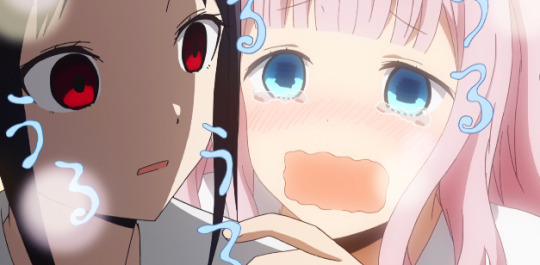
Figure 1.1.6: If your prospective lover won't protect you, then your friend definitely will.
Chika is the ideal wild card and agent of chaos in this arena of love.
From a writing perspective, Chika is immensely useful. The mangaka probably could have gotten by without a third character in the mix, but she serves as a catalyst and an unknown element, able to create unpredictability and subversion of expectations. For a comedy-oriented story, this is invaluable.
Blissfully unaware of the mental turmoil that plagues our two lovesick dorks, she is able to unintentionally invalidate whatever schemes that Kaguya or Shirogane spent so much mental energy on, which adds extra comedy and tension for the audience. She is also an effective vehicle for Kaguya's jealousy and projection, as seen in the lunchbox scene which I have so graciously foreshadowed.
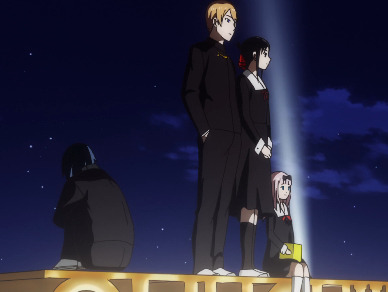
Figure 1.1.7: We have confirmed visual on an unidentified fourth person. Chekhov would love this. From their posture, I wonder if they'll be a gloomy character?
Misunderstandings and assumptions
I've heard that most interpersonal conflicts in life emerge from misunderstandings. In the absence of communication, assumptions are born and give rise to misunderstandings.
You may know where I'm going with this. Let's talk about the lunchbox sequence.
Figure 1.1.8 (not pictured because tumblr wishes to deny me of my image spam): Kaguya is too prideful to admit she thinks that a couple is doing something cute.
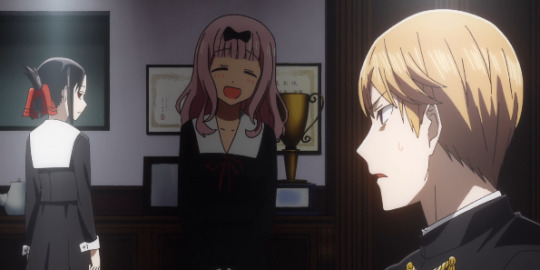
Figure 1.1.9: Pride is considered a sin for a reason.
From a writing perspective, I was impressed by the lack of romantic intentions in Shirogane in this whole sequence. Not once did he try to get Kaguya to show vulnerability to him. Instead, Kaguya is the only one spinning the situation in a romantic way, while Shirogane's driving force is the misunderstanding that Kaguya is looking down on him for what he eats. Because of this misunderstanding, Shirogane doubles down and makes his food even better, making the situation even more complicated and more stressful for Kaguya. This was definitely my favorite comedy sequence from the first episode.
I appreciate that the show has demonstrated the ability to create these scenarios where one of the characters doesn't even have love on their mind, but there are still romantic thoughts coming from the other character which drives the drama. It gives me a lot of faith in the variety this show will have to offer, and makes me excited to watch more.
When it comes to comedy rooted in misunderstandings, it is important to have miscommunication or lack of communication. In order to resolve a misunderstanding, you need to talk about it. For a pairing as dysfunctional as Kaguya and Shirogane, expecting healthy communication sounds highly unreasonable, which makes them prime material for a whole world of misunderstandings.
Misunderstandings are rooted in assumptions about what the other person meant when they said something or made a certain gesture or expression. When Kaguya glared at Shirogane and his food, he didn't even think to ask "What's the matter?" He just made an assumption about how she felt. I wonder if trying to understand Kaguya's feelings would be considered a sign of weakness by Shirogane?
A prerequisite to initiating an emotional conversation is the desire to understand or be understood by the other person -- assuming that your assumptions haven't already built a narrative for you. It is far easier to make assumptions than it is to attempt any sort of understanding.
In the end, Shirogane fled, unwilling to confront or attempt to understand the intense and passive-aggressive Kaguya. Kaguya feels that she cannot directly ask to try his lunch, so perhaps this is the closest she can get to initiating such a conversation with him at this time. Despite their mind games where they imagine the reactions of their opponent, they still have a lot of difficulty understanding each other.
I am curious to see if this prospective couple's communication skills and emotional intelligence will improve over the course of the story.
The burden of potential romance
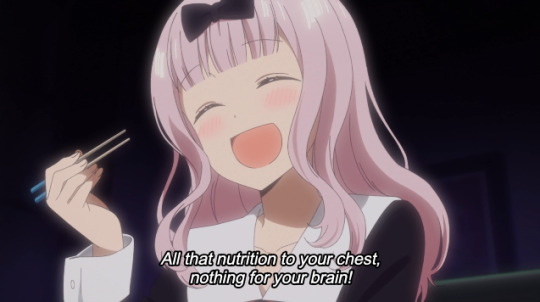
Figure 1.1.10: Even the infallible genius Kaguya succumbs to superficial jealousy. It's "mind over matter" versus "matter over mind". That's how the saying goes, right?
Chika is a free spirit, able to ask Shirogane for whatever she wants without being neurotic. That is the power of not being bounded by a crush. Kaguya, who lacks that degree of freedom, briefly loathes her for experiencing something that Kaguya cannot ask for. It's amazing how much someone's feelings for a friend can change without a single word being spoken between them. All it takes is an action, unintentional or not, combined with the raw strength of insecurity. Just as quickly, the status quo can return back to normal too, with the act of properly making up.
To Chika, asking for food from someone doesn't mean anything at all, whereas with Kaguya, it is an admission of defeat. In that sense, a relationship that will only ever be platonic brings peace of mind, whereas a relationship that can be potentially romantic brings leagues upon leagues of anxiety if the outcome is of great concern.
Love is neurotic.
Is love worth the pain? For some people, it is not. For others, the reward is immense -- but only if you can make sure your relationship with this person doesn't end up being a nightmare for your emotional health.
Love and self-identity
The final scene of the episode surprised me in a good way. It's a brief departure from the comedy, and reveals a more heartfelt side of the show.
Kaguya's servant asks her an insightful question. It is substantially more insightful than I would expect from any romcom: "If you fell in love some day, would you wait for that person to confess their love, like now? Or would you confess your love?" I found myself immediately curious to hear Kaguya's answer, since I knew it would be highly informative about her character.
"If that time comes, I would consider the risk of someone stealing him first and come to the one rational conclusion." Even in the realm of love, Kaguya seems precise and calculating. It's as if she hesitates to give a straight answer, but then she confirms: "Of course I would go."
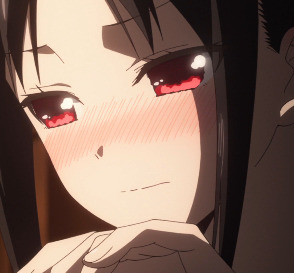
Figure 1.1.11: "Please understand."
It is not embarrassment or rejection that Kaguya fears; it is the absolute destruction of her identity and sense of self. Kaguya is the daughter of a family that practically runs the country. In her mind, everyone yearns for her and wishes to serve her. Turning that around and reaching out to another person to express her own desire would be a direct contradiction of that. It is probably a similar situation for Shirogane, where the infallible self-image he has built up is being put at risk during his romantic duels against Kaguya.
Kaguya clearly feels trapped. She and Shirogane see each other as threats to be conquered, but in reality, they both share a mutual enemy that is much more imposing and insidious: their own simultaneous disgust at the idea of vulnerability.
Their freedom is dominated by their insecurities, and so, even despite their impressive stature, they are still very human. Their upbringing that has lead them to become so accomplished may be more of a curse than a blessing, due to the resulting pride and self-image they likely feel pressured to uphold.
It is hard to cast aside a lie that you have bought into for your whole life.
If our two protagonists wish to have a chance of establishing a healthy romantic relationship, they have a lot of their own demons to overcome first. If they cannot set aside their pride and reach mutual understanding, they have no hope.
Until then, they will both remain trapped in a hell of their own design, however tragically comedic it may be.
My hopes for this story's future
I can tell that the mangaka, unlike far too many writers all over the world, actually seems to have a solid understanding of romance and the conflict that arises within. I've watched too many anime that place huge focus on the "will they or won't they" crap which never runs any deeper than one or both of the characters being too embarrassed to just say what they're thinking, without any sort of convincing mental blocker. In that case, it's clearly just manufactured drama which is designed to pad out the story and waste your time rather than pose interesting questions and themes. In the case of Kaguya and Shirogane, the two of them have substantial communication issues which are depicted in a comedic yet mature way, which I have found engaging.
I very much hope that the show will more deeply explore the themes and questions surrounding the ideas of vulnerability, emotional intelligence, and superiority within relationships. Kaguya and Shirogane have been set up to be great vehicles for such exploration, and I hope the mangaka can capitalize on that, especially if our protagonists can confront these issues directly.
My impression is that the ending will make or break this story. If the mangaka can pull it off well, I can already believe the payoff will be hugely satisfying.
Of course, in order to get to that point, we'll have to see a certain something. It has to do with the most sacred word amongst romcom enthusiasts: "progress". Indeed, after spending chapters upon chapters watching two characters bumble around amidst the same exact status quo, those little signs of advancements in a relationship are highly rewarding.
Underneath all of their aggression, if we can see Kaguya and Shirogane slowly open up to each other and realize the benefits of vulnerability, I think we could witness something really beautiful and really emotionally cathartic.
I've still only seen one episode, but I believe the mangaka has laid a fantastic groundwork for a series and can do a great job developing upon what I've seen so far. On that note, I will surpass our prideful protagonists by opening my heart to this story and entrusting it with my vulnerability, believing it can deliver satisfying development and resolution. You can do it!
Closing thoughts
I did not expect to write so much about a single episode of an ANIME of all things, but here we are. If only I could conjure this kind of power back when I actually needed it in high school English class!
The first episode alone is already so rich with characterization and themes that I managed to find quite a lot to talk about. Given how much I found myself relating to the characters and some of their situations, it's clear to me how this show became so popular. Not only are the animation, direction, and writing excellent, but also many people can probably relate to love feeling like a battlefield.
I do not want to believe in the idea of winners and losers in relationships. That idea creeps into my head whenever I'm having trouble keeping the interest of a new date, and I find myself wondering where those thoughts even come from. Lately, I have been reflecting on the way I relate to other people. Perhaps I've started experiencing this show at a time in my life when I most needed it, and that's why I felt driven to write such a large analysis.
This show poses some very interesting questions about romance that I do not actually know the answer to at the time of writing. I do not know yet how much the show is actually going to explore these themes. Regardless, I appreciate how this show is helping me reflect, and I am curious to see if and how the mangaka will answer some of the questions brought about by the story's themes.
This is a show that I'll most likely have to pace myself with. There was so much to process in this first episode alone. If I went any faster, I'm not sure if I'd even catch all of the details and character moments. I'm excited to move onto the second episode soon.
A highly subjective footnote about my cultured tastes
I'm glad that Kaguya is a sadistic dom with a gentle and vulnerable side, solely on the basis of that being my favorite personality type in a love interest. It also helps that it makes Kaguya's fantasies that much funnier with Shirogane acting so out of character. I feel like this show was made for me.
What was I writing about again? Oh yeah, writing a gigantic wall of text about an anime romcom. Somehow, I spent an entire day on this essay. Hopefully someone got a kick out of it.
25 notes
·
View notes
Text
Labor history is precisely the environment in which I first noticed this kind of thing, I had a graduate reading seminar in left-wing radicalism when I was doing my first Master's degree and seemingly every book had this wild speculative quality. It's been a while since I was really in the weeds of it all but one of the main works that stands out to me is Peter Linebaugh and Marcus Rediker's the Many-Headed Hydra which tries to wrap English labor movements with abolitionism as if it were all one self-consciously unified struggle which I just do not think even their own analysis supports
The thing I just read was in a collection responding to the 1619 Project and trying to situate American slavery in a hemispheric/Atlantic context and this guy was writing about three different models of colonization in early Virginia and how there was this small band of Puritan settlers in the 1620s who opposed arbitrary power and so maybe they would have been antislavery in the way that the Puritans of Massachusetts were antislavery, at least in the sense that they wouldn't rely so heavily on slavery, but the reason that Virginians relied so heavily on slavery is that the main cash crop that they adopted was tobacco and it was the only thing they could really grow for a profit in that climate and they used slaves to grow it because that was the only way to turn a profit doing it so really the mass adoption of slavery has less to do with the religious conviction of settlers in a given area and more to do with the climate of the area and the kind of agricultural regime the climate supported and also the general assumption of the entire colonizing venture which was in the main an effort to generate profit; and then he argues the vision of labor exploitation that dominated in Virginia arose during the English Civil Wars as a result of that particular group's ability to mobilize and capture the legislature but that is the group that had all the money so of course they're the ones who managed to consolidate as happens constantly in human history. We don't even have evidence by his own admission that this Puritan group would have been any softer on slavery, he just thinks that in their silence and the analogy of Massachusetts that maybe they would have been antislavery. And then he doesn't even engage with the fact that these Puritans were themselves a tiny minority. "If they had had their way then Virginian history could have been totally different" OK but in what way was that ever going to happen? Show me the moves by which this incredibly unpopular idealistic religious movement expands enough to take power. They just didn't have the numbers. How would they ever have gotten them??
In order to make a compelling case for how Virginia could have developed otherwise in a broader colonial world in which all European colonies including the Puritan colonies in the Northeast were heavily implicated in slavery and the slave trade you need to demonstrate a compelling example of European colonization that does not rely overwhelmingly on the extraction of profit from the New World and/or that is not dictated by the environmental possibilities of the area settled. I don't mean to say that history is entirely deterministic but events tend to follow a logic and an English colony being antislavery would radically differ from the model of almost every other colonization venture. Where are the turning points? When could Virginia have rejected slavery and why would they have done it? What would they have done otherwise?
The real problem is that most Leftist scholarship is not interested in the world as it is, but the world as it should be, and they need to make these incredibly strained arguments for how history could have gone otherwise specifically to plant the idea that life could be different now but I just don't find it compelling in almost any instance, precisely because it is based on imaginative and speculative reading in defiance of events as they occurred, and wishful projection on silences in the written record.
Leftist historians are always like "there's nothing pre-ordained about history look at how rich with possibilities everything is" before admitting that almost all their alternative visions are based on speculative reading of vanishingly thin source bases and then showing how the rich people won yet again
#Ada Ferrer did a similar thing recently in her book on Cuba#she does it in a fairly intellectually responsible way#it's actually a pretty good book#she's very open about when she speculates#but it is very speculative#it's like those historical fiction things you see where the Obvious 21st Century Person stares at the camera to roll their eyes at racism#except it's people with PhDs publishing actual professional scholarship#I mean sometimes I feel like it verges on pointless tautology#'history could have been different if it had been different'#'what if they just like...didn't do slavery'#'what if they just didn't racism'#'what if the rich people gave up their money'#yeah man I mean anything can happen right
21 notes
·
View notes
Note
Ooh, I'm gonna chime in here, partially because as the person who wrote the initial love language post my thoughts have evolved a bit since then.
So an individual person's love language is the same through giving and receiving - but, people usually have more than one love language (mostly people have at least two they're naturally "fluent" in, with one that's more dominant than the other; some people might have more). Also, part of being in a healthy relationship is learning your partner's natural love language and making an effort to express love to them in those ways. So I think what's happening here is not actually that Shiv is oblivious to Tom's love language, but that she knows he values physical affection and so makes an effort to be physically affectionate with him when they're in private.
And it adds an extra layer to scenes like this, because it explains the deeper level of what's going on - Shiv has a much harder time standing those expressions of love when she's around her family, who might view it as weakness; but, it also stings extra for Tom that she rejects him like that in public, because it is the primary way he expresses love.
The words of affirmation thing is also really interesting - I had kind of forgotten about her reaction to tom congratulating her after the deal. And I think it actually does make sense, maybe even more so than acts of service. Whenever she senses that Tom is hurt or distant, she uses physical affection, bc that's his love language, when she is hurt or distant, on the other hand, she asks for a verbal affirmation of his love (I'm thinking both the beach scene and the tarmac at the beginning of season 1, and even 'i may not love you but I do love you' to an extent). Verbal reassurance also seems to be Tom's go-to with her when she's rattled or upset.
So that's an interesting lens to view their conversations at the beginning of season 3 through, specifically the ones where he's hesitant to tell her he loves her. At the same time, I don't think it's quite so simple as Tom trying to hurt her. One of the major themes throughout the show is honesty + dishonesty, not just through deceit but also through artifice - we're pretending something is the way we want it to be but it's not. It's a particularly important theme in Tom and Shiv's relationship, where they're constantly not quite saying what needs to be said, or not quite saying what they actually feel, or not quite saying what they mean. And it's part of what makes both the beach conversation and the wedding night conversation so devastating; they're these moments of raw unembellished honesty in a world that so often discourages that. And in a sense, in spite of how emotionally awful those conversations are, they actually provide some hope for Tom and Shiv as a couple, because they're finally communicating openly. The tragedy is that they almost immediately go back to their old ways of non-communicating, so the moments of honesty don't have the impact they should.
(As a side note there's a Matthew Macfadyen interview where he talks about part of the reason Tom doesn't object to the open marriage is even though Shiv asking for it is devastating, she so rarely opens up to him like this, and that honesty and intimacy is so valuable to him that it makes him believe they can maybe make it work, even though it's not something he wants.)
Tom's admission at the end of season 2 that he's unhappy is huge, for him, because prior to that he really comes off as someone who believes part of loving someone is being as un-burdensome as possible - he's constantly ignoring and quashing his wants and needs to support Shiv, assuming that this'll make the relationship work, and also assuming that she'll do the same for him when the rubber hits the road. (Part of that is also the anxious attachment style). Her advocating for him to be on the chopping block on the yacht causes him to realize that it isn't the case, and to feel that all the sacrifices he's made were pointless.
So I think at the beginning of season 3 he’s reluctant to give Shiv those words of affirmation, but a lot of it is because he feels that there’s a larger conversation that needs to be had - and work that needs to be done - before they can go back to being a happy couple (or pretending to be one). Shiv seems to think that her going to bat for him with Logan has squared them away, and Tom doesn’t feel that way. (I would bet dollars to donuts that part of it is that while Shiv told Tom she persuaded Logan not to sacrifice him, she didn’t tell him what it cost her - so he doesn’t understand the full extent of what she did, which doesn’t help anything.) I think him being withholding, especially in the first two eps, is him trying to force that conversation.
Unfortunately it never really happens in the way it needs to, because their communication is absolute trash and frankly they should have gone to couples therapy a while ago to try and deal with that. That 'love portfolio' dialogue drives me INSANE because your marriage is in crisis, Tom, you need to say what you mean for once in your damn life, please, please, I am begging you, have five seconds of emotional honesty with yourself and your spouse!!!! A lot of couples therapists actually recommend ‘preventative’ or ‘preemptive’ counselling, because if your communication is poor and a crisis hits - well, it’s generally not the best time to start working on your relationship, and that’s the situation Tom and Shiv find themselves in.
I think that understanding Shiv’s love language as words of affirmation also makes the ‘I don’t love you’ scene hit harder. Maybe for someone else they could have played it off as dirty talk, but if words of affirmation are your primary love language, you probably aren’t going to go there unless you at least kind of mean it. (I do think Shiv loves Tom, to be clear - but what everyone forgets about that scene is she follows it up with 'Not as much as you love me', which I think is an accurate assessment - Shiv loves Tom as much as she is capable of loving someone, but she's still in a situation where Tom loves her more openly and freely than she loves him).
So the TL:DR is basically - I think anon is write about words of affirmation, and I think it’s not a situation of them being oblivious to their respective love languages, but that the other issues in their relationship often manifest through those love languages somehow.
i don’t know very much about love languages but are peoples giving love language and receiving love language different? shiv seems super uncomfortable with receiving physical touch as a love language but okay with giving it when it’s what tom needs. excluding times that she tries to comfort him (or distract him, depending on how you want to read it) with sex, because im not sure if that counts, i’m thinking of them sitting on the couch after his meeting with the lawyer, or her hand on his shoulder when she tells him she might not love him but she loves him. the main differences between those and the example in your gif is that they’re alone, and it’s about him, not about her. i also think that she has such an interesting relationship with words of affirmation as a love language, like she’s pretty uncomfortable giving it, and she’s uncomfortable receiving it to an extent but i think she really does want it but doesn’t want to want it, or only wants it on her own terms or something. like when she asked tom if what she said at the wedding was okay, and how happy she looked when he was proud of her for making the deal with sandi. i wonder if tom knows that a little bit and knows to withhold it in certain parts of season 3 as a way to hurt her, because he doesn’t really have many options of other ways
well, first of all, i'd like to use this ask as an opportunity to drop that scene that i gifed for the post, because people in tags misjudged it a bit.
i 100% agree on the things that you said here. i would really like to give you something on their love language and relationship in general, but, unfortunately, i am emotionally stupid and also don’t know enough words. so i’m just gonna drop this post here, which pretty much comprises my opinion on this topic
also maybe the thing with tomshiv is that tom has an anxious-preoccupied attachment style and shiv has a dismissive-avoidant attachment style, and relationships of this kind are pretty hard to figure out (on top of the fact that their marriage was corrupted by family business)
35 notes
·
View notes